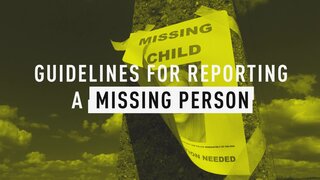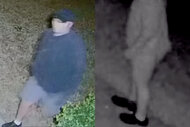Create a free profile to get unlimited access to exclusive videos, breaking news, sweepstakes, and more!
How To Stay Safe: How To Report A Missing Person
More than 80 thousand missing persons cases remained active by the end of 2018, according to the National Crime Information Center. Experts share tips and insight with Oxygen.com on what to do if a loved one disappears.

In June 2014, pregnant 19-year-old Erin Corwin went missing after telling her husband Jonathan she was going to check out hiking trails. Her husband waited until the next day to report her missing. He believed he had to wait 24 hours to report a missing person, according to local news outlet KMIR.
A romantic relationship between Corwin and her married neighbor Chris Lee was uncovered. Lee was later found guilty of Corwin’s murder and sentenced to life in prison without the possibility for parole.
Corwin’s story is explored in Oxygen’s “Killer Affair.” The series examines cases involving secret relationships, romantic trysts, and lovers scorned. Although missing persons cases aren’t always linked to an affair, Corwin’s husband isn’t alone in being unsure of how or when to report.
More than 600,000 people go missing in the United States every year, according to the National Missing and Unidentified Persons System (NamUs). The program tries to resolve missing, unidentified, and unclaimed person cases across the country using its database, technology, and working with families or law enforcement.
Although it might be easy to view the number as merely a statistic, when even just one person goes missing it can have a lasting impact on families left behind and communities living in fear. This is a daunting reality amplified by the fact that more than 80,000 cases reported in 2018 remained active by the end of that year, according to the National Crime Information Center.
Here are some guidelines experts recommend you know when reporting a missing person.
Once you know something is wrong, report the person missing immediately.
If a loved one doesn’t follow their routine and come home from work at a late hour or you can’t contact them for an extended period of time, try to reach out to their partners, close friends, and jobs first.
Dr. Michelle Jeanis, Assistant Professor at the University of Louisiana at Lafayette who focuses her research on missing persons, told Oxygen.com waiting times to report are often a thing of the past and a major misconception. Jeanis suggests not keeping any secrets from law enforcement when reporting, including if a loved one has a substance abuse problem.
“They’ll investigate the case no matter what and I know that some families can get concerned that maybe law enforcement won’t take them seriously if that family member isn’t perhaps an ideal sort of victim or a perfect person, but know that honesty is going to help no matter what,” Jeanis said.
Be Prepared When Going To Authorities
Todd Matthews, who is now the Director of Communications and Outreach at NamUs, said during an interview with Oxygen.com, being readily prepared with the information law enforcement needs can help make a difference in their search for someone. Matthews is also featured in Oxygen’s digital series “Dark Web Exposed.”
The basic information Matthews said he would ask for is an up-to-date photograph, model of car they have been driving, age of the person, height, their last known location, who they were with, and any other identifying characteristics like tattoos.
If it’s a case dealing with a missing child, Jeanis recommended parents also contact the National Center for Missing and Exploited Children.
Get The Word Out To the Public
Another reality many relatives and friends face when someone goes missing is having to speak out in the media.
Be ready to speak to outlets to help spread the word about your loved one. Matthews recommended checking with law enforcement beforehand to make sure it doesn’t interrupt the investigation.
Jeanis added the media can be an ally at times, especially if you’re trying to get more eyes on the case.
“If there’s some media attention or if you can generate the media attention I strongly suggest that that’s done within the first 24 to 48 hours,” Jeanis said. “In addition, even though it’s probably going to be really hard if a news channel wants to interview you, take that interview, get that publicity…”
Another option is to take to social media. Several relatives of missing persons have started social media pages to relay descriptions of the person and the situation, as well as case updates.
To create missing persons posters, some nonprofit organizations will offer to help print and distribute around your community, according to Jeanis.
“A standardized flyer that looks a certain way with the demographic information,” Jeanis said. “I would start blanketing the community with those flyers you know trying to get more eyes out there.”
Matthews highlighted make sure all tips are being funneled to the appropriate law enforcement agency and not a personal number even if the family is offering a reward.
“That’s kind of unpredictable and you’re motivating people to say things that might not necessarily be true,” Matthews said. “I’ve seen that happen where somebody is passing along a rumor and hopes to get a reward from a tip…”
It’s important for trained law enforcement to have access to all tips to decide which are credible to follow up on, according to Matthews.
Work With Law Enforcement
When first speaking with local law enforcement, take down a phone number and the name of the corresponding officer you can reach out to for updates.
Matthews said make sure you are coordinating with law enforcement if you begin searching.
Jeanis added sometimes law enforcement agencies conduct searches using canines, but tracking a scent can be limited to a short time window depending on when the person went missing.
“There’s going to be lots of nonprofit organizations like EquuSearch, the nonprofit organization with the horses that can help certain foot patrols,” Jeanis said. “It might be community members doing foot patrols as well.”
Register Your Loved One In The NamUs Database
If a loved one isn’t found soon, Matthews said there will come a time when investigators may ask for dental records or DNA samples.
“We should plan for the worst and hope for the best…,” Matthews said.
Matthew added family members and law enforcement can register a relative’s case in NamUs immediately if they feel it’s necessary.
A 30 day rule for law enforcement to enter cases into NamUs only applies in states that have passed a law requiring it, according to Matthews. The time frame to enter cases into NamUs can also differ. For example, New York requires missing and unidentified persons to be entered into the system within 180 days.
If a loved one remains missing for a long stretch of time, in addition to reporting to NamUs, Matthews added to not give up.
“There’s always something more that can be done,” Matthews said. “Anniversary dates are really important because that catches the eye of the media.”
He added reporters can direct viewers to give any information to law enforcement.
Watch “Killer Affair” Thursdays at 8 p.m. ET on Oxygen or catch it on the Oxygen app.
Editor's Note: An earlier version of this article described cases as being entered into NamUs after 30 days. The rule only applies in states that have passed a law to require and the time frame required for entering a case can vary.





























